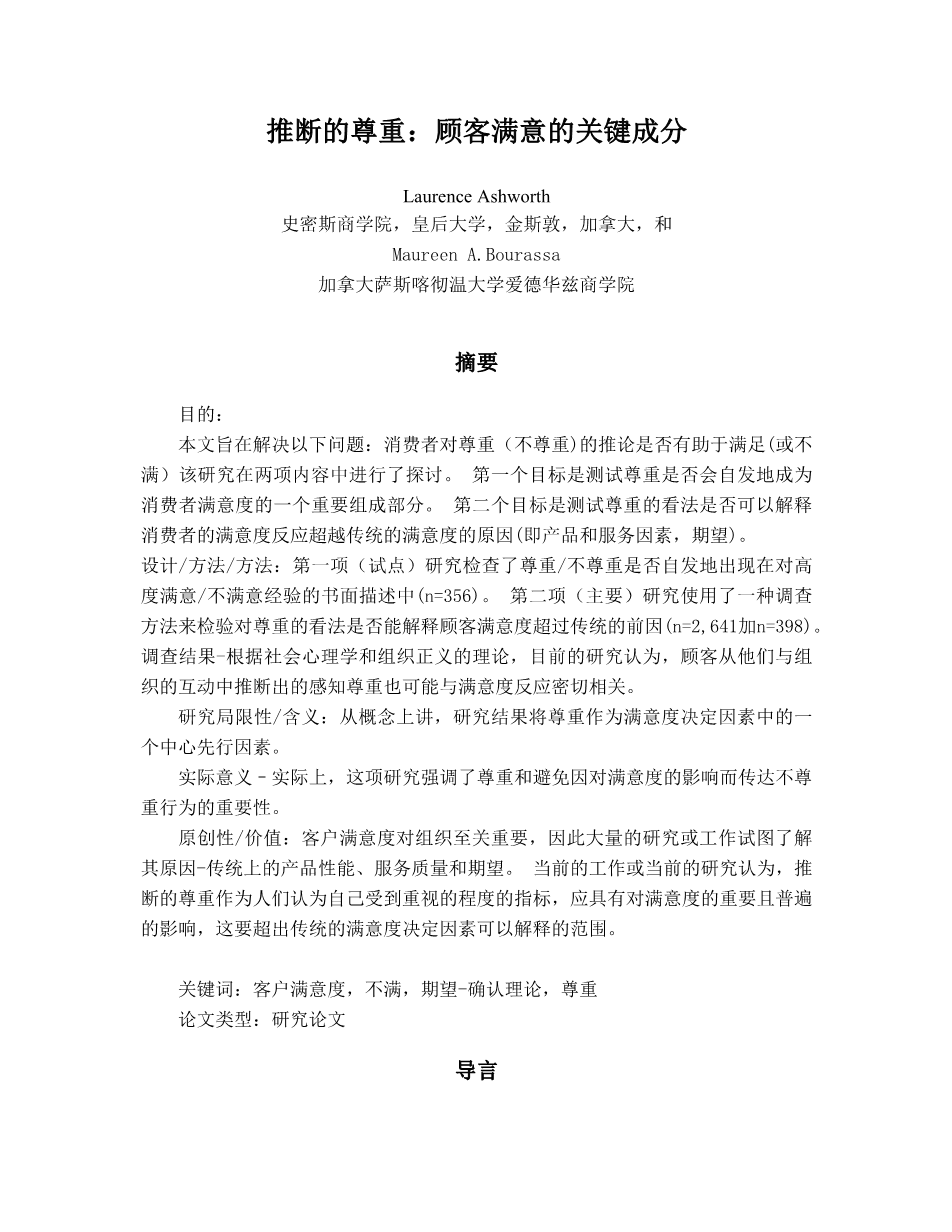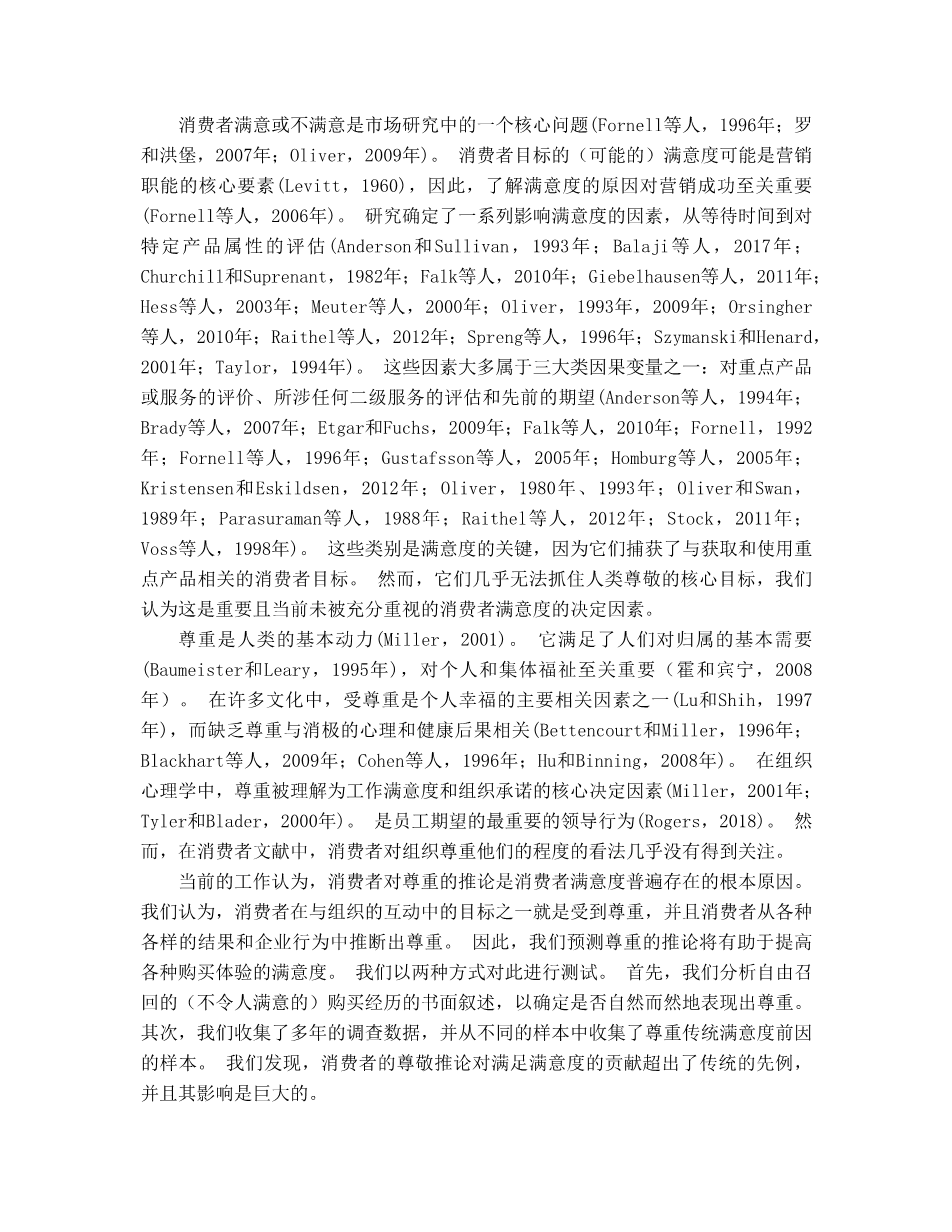推断的尊重:顾客满意的关键成分外文翻译资料
2023-07-21 09:58:16
Inferred respect: a critical ingredient in customer satisfaction
Laurence Ashworth
Smith School of Business, Queens University, Kingston, Canada, and
Maureen A. Bourassa
Edwards School of Business, University of Saskatchewan, Saskatoon, Canada
Abstract
Purpose: This paper aims to address the following question: Do consumer inferences of respect (disrespect) contribute to satisfaction (dissatisfaction)? The research question is explored over two studies. The first aimed to test whether respect spontaneously emerged as an important component of consumer satisfaction. The second aimed to examine whether perceptions of respect could explain consumers satisfaction response beyond traditional antecedents of satisfaction (i.e. product and service factors, expectations).
Design/methodology/approach: The first (pilot) study examined whether respect/disrespect spontaneously emerged in written descriptions of highly satisfactory/ dissatisfactory experiences (n = 356). The second (main) study used a survey methodology to test whether perceptions of respect could explain customer satisfaction beyond traditional antecedents (n = 2,641 plus n = 398).
Findings – Drawing on theories from social psychology and organizational justice, the current study argues that perceived respect, as inferred by customers from elements of their interactions with organizations, may also be critically involved in the satisfaction response.
Research limitations/implications: Conceptually, the findings place respect as a central antecedent among satisfaction determinants.
Practical implications – Practically, this research underscores the importance of enacting respect and avoiding actions that communicate disrespect because of their effect on satisfaction.
Originality/value: Customer satisfaction is critically important to organizations and so a great deal of research or work has sought to understand its causes – traditionally product performance, service quality and expectations. This current work, or This current research argues that inferred respect, as an indicator of the extent to which people perceive they are valued, should have an important, and general, influence on satisfaction that goes beyond what traditional determinants of satisfaction can explain.
Keywords: Customer satisfaction, Dissatisfaction, Expectancy-disconfirmation theory, Respect
Paper type: Research paper
Introduction
What satisfies or dissatisfies consumers is a central question in marketing research (Fornell et al., 1996; Luo and Homburg, 2007; Oliver, 2009). The (profitable) satisfaction of consumer goals is, perhaps, the central element of the marketing function (Levitt, 1960) and, thus, understanding the causes of satisfaction is critical to marketing success (Fornell et al., 2006). Research identifies a range of factors that affect satisfaction, from waiting times to assessments of specific product attributes (Anderson and Sullivan, 1993; Balaji et al., 2017; Churchill and Suprenant, 1982; Falk et al., 2010; Giebelhausen et al., 2011; Hess et al., 2003; Meuter et al., 2000; Oliver, 1993, 2009; Orsingher et al., 2010; Raithel et al., 2012; Spreng et al., 1996; Szymanski and Henard, 2001; Taylor, 1994). Most of these factors fit within one of three broad classes of causal variable: evaluations of the focal product or service, assessments of any secondary service involved and prior expectations (Anderson et al., 1994; Brady et al., 2007; Etgar and Fuchs, 2009; Falk et al., 2010; Fornell, 1992; Fornell et al., 1996; Gustafsson et al., 2005; Homburg et al., 2005; Kristensen and Eskildsen, 2012; Oliver, 1980, 1993; Oliver and Swan, 1989; Parasuraman et al., 1988; Raithel et al., 2012; Stock, 2011; Voss et al., 1998). These categories are central to satisfaction because they capture consumers goals associated with obtaining and using the focal product. However, they do little to capture the central human goal of feeling respected, which we predict is an important and currently underappreciated, determinant of consumer satisfaction.
Respect is a fundamental human motivation (Miller, 2001). It satisfies peoples basic need to belong (Baumeister and Leary, 1995) and is essential to individual and collective well-being (Huo and Binning, 2008). Feeling respected is one of the primary correlates of individual happiness in many cultures (Lu and Shih, 1997), and perceiving a lack of respect is associated with negative psychological and health outcomes (Bettencourt and Miller, 1996; Blackhart et al., 2009; Cohen et al., 1996; Huo and Binning, 2008). In organizational psychology, respect is understood to be a central determinant of job satisfaction and organizational commitment (Miller, 2001; Tyler and Blader, 2000). It is the most important leadership behavior expected by employees (Rogers, 2018). Yet in the consumer literature, consumers perceptions of the extent to which organizations respect them have received almost no attention.
The current work argues that consumers inferences of respect are a pervasive underlying cause of consumer satisfaction. We argue that one of consumers goals in their interactions with organizations is feeling respected and that consumers infer respect from a wide variety of outcomes and firm actions. As such, we predict inferences of respect will contribute to satisfaction across a variety of purchase experiences. We test this in two ways. First, we analyze freely recalled written narratives of (dis)satisfactory purchase experiences to determine whether respect spontaneously emerges as a salient characteristic. Second, we collect survey data over several years and from different samples in which we measure respect alongside traditional satisfaction antecedents. We find that consumers inferences of respect contribute to satisf
剩余内容已隐藏,支付完成后下载完整资料


英语译文共 25 页,剩余内容已隐藏,支付完成后下载完整资料
资料编号:[605404],资料为PDF文档或Word文档,PDF文档可免费转换为Word




